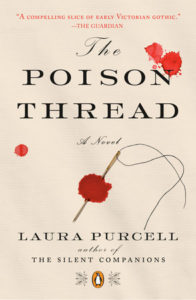My latest novel The Poison Thread revolves around a teenage seamstress accused of murder. Although she confesses to the crime, her bizarre recollection of the events that led to her incarceration leaves others doubting her sanity. Could she be spinning these tales for her own amusement? Or is it a life of terrible hardship that has forced her down this dark path?
The concepts of guilt and innocence have fascinated mankind for centuries. While some of the oldest tales show a straightforward fight between good and evil, the most compelling narratives tend to recognize that the truth is rarely simple. Villains may not be bad in all areas of their life, and even heroes have their shade.
The advance of psychology is certainly one aspect that has helped us understand complicated actions. It is generally recognized by law that mental or even physical illnesses can cause behavior that is ‘out of character’. Yet ‘blame’ for tragedies can seldom be ascribed to an individual—however convenient the idea may be.
The modern writer perhaps has a better conception of how narratives can be manipulated by others. In stories that shift between several characters’ points of view, we get the uncomfortable feeling that guilt could be subjective—or, more frighteningly, that no one is completely innocent.
I have picked a selection of my favorite novels that play with the theme of guilt and will have you questioning your own morality.
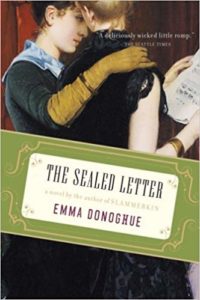
The Sealed Letter by Emma Donoghue
Of all court cases, divorce proceedings must top the bill for the most interesting charges and counter-accusations. Both parties will have a story to tell. But when Emily reconnects with her old schoolmate Helen, who is trapped in an unhappy marriage, she naturally takes her friend’s side.
As a pioneer for women’s rights, the faithful Emily is keen to help Helen obtain the separation she craves—a rare event in the 1860s. Yet Helen, reckless and on a crash course for disaster, is not as blameless as she appears.
Based on a real-life scandal, this is one of the most compelling and masterfully plotted books I have ever read. Lies, misogyny, hypocrisy and a good old dash of Victorian sensationalism bring this court-room drama to vivid life.
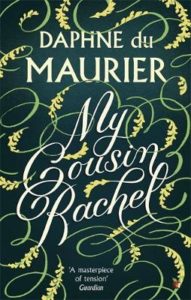
My Cousin Rachel by Daphne Du Maurier
If there was an award for writing amoral, ambiguous characters, Daphne Du Maurier would surely win it. My favorite novel of hers begins with an orphaned boy, Philip, who is adopted by his elder cousin Ambrose. The two share a happy and mutually dependent life until, one summer, Ambrose travels abroad and marries.
Philip’s natural jealousy deepens into something more sinister as he receives letters from an increasingly erratic Ambrose, suggesting all is not well between the newly-weds. Shortly after, Ambrose dies and his widow turns up on Philip’s doorstep.
This story is a masterclass in psychological tension. The reader is absorbed in Philip’s wild tussle with love, jealousy and suspicion. Du Maurier flips your opinion as quickly as a coin. I guarantee you will be obsessively considering and re-apprising the characters in this book long after it ends.

The Blind Assassin by Margaret Atwood
We are often told that evil triumphs when good people do nothing. In her Booker-Prize-winning masterpiece, Atwood explores precisely that. Can you be so caught up in your own life and troubles that your actions inadvertently lead to another’s death?
The tale of sisters Iris and Laura Chase is separated into three narrative threads: Iris’s recollections as an elderly woman, newspaper articles from the past and passages of Laura’s posthumously-published novel. Layer by layer, Atwood peels down to the darkest depths of human nature and its capacity for self-deception. While the story has profound and serious themes, reaching far beyond the relationship between the two sisters, it is nonetheless full of Iris’s acerbic wit.
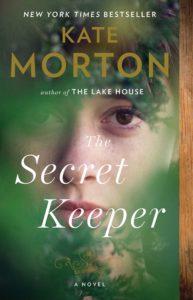
The Secret Keeper by Kate Morton
I am a big fan of Morton’s twisty time-slip novels, and this one delivered a jaw-dropping, gasp-out-loud moment for me.
Teenager Laurel witnesses a crime committed by her mother, Dorothy. Neither of them speak of it, but the weight of this silence will haunt Laurel throughout her life. When Dorothy reaches the age of ninety and begins to descend into dementia, Laurel knows that she must discover the truth about her mother’s past now or never.
Alternating between present day and World War II, this story features Morton’s hallmark beautiful prose, family secrets and wonderful turns of plot. It reveals how little we know other people, most of all those closest to us. I particularly admire how Morton approaches her elderly characters and criticizes those who judge them on current circumstances.
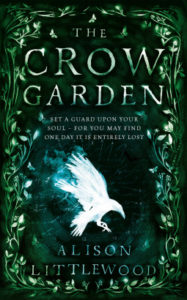
The Crow Garden by Alison Littlewood
Fiction set in an asylum often makes us question whether true mental imbalance lies within the patients or the doctors, a device that Littlewood uses to terrific effect in this claustrophobic Victorian gothic.
Our protagonist, mad-doctor Nathaniel Kerner, takes up a new job in the remote Yorkshire moors, where treatments are rather less progressive than he would like. The monotony and frustration of his life are only lightened by the arrival of beautiful Victoria, deemed ‘hysterical’ by her husband.
Aware of how conveniently troublesome women can be put aside, Nathaniel begins to doubt the motives of her incarceration. All his experience warns him not to trust a confirmed ‘lunatic’, least of all one he is attracted to. But can he really be part of an institution that imprisons for monetary gain?
An absorbing tale that plays adroitly with the concepts of reality and trust.

Wakenhyrst by Michelle Paver
There is no author like Paver for making the hair prickle on the back of your neck. Her latest gothic novel recounts the dark history of a house on the edge of the Suffolk fens.
We know from early on in the story that Maud’s father Edmund is going to commit a grizzly crime. The question is: why? Shifting between the perspectives of Maud, an intelligent girl growing up in Edwardian England, and her father’s secret notebooks, this novel offers a disturbing glimpse into how fear starts and breeds.
We learn that Edmund is plagued by ‘devils’, a misfortune that intensifies after he discovers a supposedly cursed painting in the local church. But does the fact that Edmund is mentally ill in any way lessen his repulsive character? And is Maud’s failure to prevent his actions the same as guilt? These are just some of the questions posed in this beautifully-written and genuinely unsettling ghost story.

The Unseeing by Anna Mazzola
Mazzola won a prestigious Edgar Award for this, her inspired retelling of the case of Sarah Gale, sentenced to hang as an accomplice for murder in 1837.
The enigmatic Sarah faces incredulity when she asserts that she knew nothing of her lover’s heinous crime, or his hiding of the victim’s body parts. As the prosecution is quick to point out, she had both the motive and the means to kill.
When earnest young lawyer Edmund Fleetwood comes to investigate her plea for mercy, he is astounded to find Sarah will not yield any information to help his case. Why would a woman with a young child, who asserts her innocence, shuffle so resignedly through prison towards death?
Victorian misogyny and classism come to the fore in this intriguing warren of a tale. Although the real life case was never solved, Mazzola provides her own satisfying and believable conclusion.
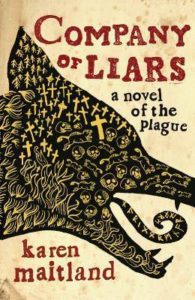
Company of Liars by Karen Maitland
The clue is perhaps in the title for this one. In a land riddled by the plague, witchcraft and poverty, nine medieval travelers throw their lot in together in a bid to survive. Each one hides a secret—some more dangerous than others.
Like all Maitland’s work, this tale is rich in creepy atmosphere and suspense, offering deep themes and a satisfying mystery at the same time. The reader is tricked time and again by a diverse cast whose character arcs not only explore the concept of mistruth, but also whether it can be morally right to withhold information.
By the end of this dark and fantastical book, the reader finds themselves faced with the scary realization that we are, essentially, the lies we tell ourselves.
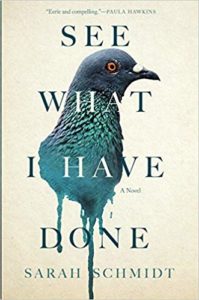
See What I have Done by Sarah Schmidt
One of history’s most famous ‘did she or didn’t she’ cases is startlingly realized in Schmidt’s literary novel. We know that one hot day in 1892, Lizzie Borden’s father and step mother are going to wind up dead, but that doesn’t stop this being a tense read.
Told through the perspectives of the unreliable and childlike Lizzie, her sister Emma, housemaid Bridget, and a stranger named Benjamin, this is vivid prose that reads at times like a fever-dream. The characters are achingly real and complex. Not only do we question whether or not Lizzie committed the crime, but whether any motive could actually be justified. Particularly uncomfortable is the suggestion that a killer rarely comes to being in isolation—it could, in fact, take a whole family to raise a murderer.
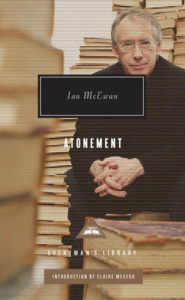
Atonement by Ian McEwan
Perhaps an obvious choice for this list, but McEwan’s masterpiece of searching for redemption is one it is difficult to forget. As we glimpse the hot summer of 1935 through the eyes of the wildly imaginative child Briony Tallis, her elder sister, and the talented but poor Robbie Turner, we are struck by how easily characters can misinterpret events—and more worryingly, convert others to their views.
Self-deception, lies and genuine mistakes conspire to change the lives of the Tallis family forever. In later years, Briony attempts to undo the damage, but events have snowballed. Can she ever be forgiven—and does she deserve to be?
McEwan expertly probes the dark heart of childhood in his creation of young Briony, but she is just one of the astonishingly drawn characters who inhabit this aching tale of love, war and loss.
***


